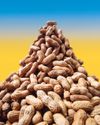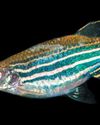
Scientific American
PEANUT PROOF
Remarkable new treatments can free millions of kids and adults from the deadly threat of peanut allergy, tackling one of our fastest-growing medical problems
10+ min |
September 2025

Scientific American
Alchemist Fish
Genetically modified fish (and fruit flies) could pull dangerous mercury from the environment
2 min |
September 2025

Scientific American
Dog Detectors
Pessimistic dogs may be better sniffersand other pointers for smelling out disease
4 min |
September 2025

Scientific American
Space Saver
A new proof dramatically compresses the memory needed for computation
2 min |
September 2025

Scientific American
A Planet Revealed
The Juno spacecraft has rewritten the story of Jupiter, the solar system's undisputed heavyweight
10+ min |
September 2025

Scientific American
Could AI Really Kill Off Humans?
Many people believe Al will one day cause human extinction. A little math tells us it wouldn't be that easy
5 min |
September 2025

Scientific American
Nerves Do Regenerate
Neurons, once thought to be irreparable, can grow anew—even in the brain
5 min |
September 2025

Scientific American
We Probably Aren't Alone
The search for advanced life beyond Earth has periodically been turned upside down
4 min |
September 2025

Scientific American
Nostalgia Keeps Friendships Alive
The social benefits of yearning for the past are starting to come into focus.
3 min |
September 2025

Scientific American
Humans Are Not So Special After All
Whales mourn, magpies exhibit self-awareness, and Venus flytraps make memories.
5 min |
September 2025

Scientific American
Midwestern Melt
The core of the U.S. may be “dripping” away
3 min |
September 2025

Scientific American
Dog Detectors
Pessimistic dogs may be better sniffersand other pointers for smelling out disease
4 min |
September 2025

Scientific American
Invest in Public Education
Cuts to funding and curricula endanger the U.S.’s status as a global powerhouse
4 min |
September 2025

Scientific American
Brain Washing
Cleaning waste from the brain is an essential function of sleep—and it could help ward off dementia
10+ min |
September 2025

Scientific American
The Cosmos Revised
The universe has a habit of disproving “unassailable” facts
5 min |
September 2025

Scientific American
Terracotta Cool
Humble clay fends off heat without electricity
2 min |
September 2025

Scientific American
The Black Hole Next Door
Superfast stars could trace back to a behemoth in a neighboring galaxy
4 min |
September 2025

Scientific American
Bitter Truths
This mushroom's incredibly bitter taste is new to science
2 min |
September 2025

Scientific American
Research in Reverse
When scientists make sharp 180-degree turns in their thinking, it is often for one of two particular reasons
10+ min |
September 2025

Scientific American
Serenading Cells
Cells can “hear” and respond to sounds
2 min |
September 2025

Scientific American
PEANUT PROOF
Remarkable new treatments can free millions of kids and adults from the deadly threat of peanut allergy, tackling one of our fastest-growing medical problems
10+ min |
September 2025

Scientific American
Alchemist Fish
Genetically modified fish (and fruit flies) could pull dangerous mercury from the environment
2 min |
September 2025

Scientific American
Cracking a 125-Year-Old Math Problem
A breakthrough in Hilbert's sixth problem is a major step in grounding physics in math
4 min |
September 2025

Scientific American
The Many Moons of Saturn
Edward Ashton helped to discover two thirds of the planet's known moons
5 min |
September 2025

Scientific American
Plastic Was Supposed to Be Sustainable
Synthetic polymers became one of our biggest environmental crises instead
4 min |
September 2025

Scientific American
RNA, Not DNA, Is the Key to Life
DNA holds our genetic blueprints, but its cousin, RNA, conducts our daily lives
4 min |
September 2025

Scientific American
Coping with a LifeAltering Diagnosis
When a child has a major health issue, learning how to manage new routines and expectations can be the key to everyone’s happiness
5 min |
September 2025

Scientific American
Gut Check
Microbes in the human intestines may absorb dangerous PFAS
3 min |
September 2025

Scientific American
Venom Marinade
Certain spiders evolved a bizarre alternative to biting
2 min |
September 2025

Scientific American
Hype about Gluten-Free Diets
Other wheat components are more likely to trigger health problems
3 min |